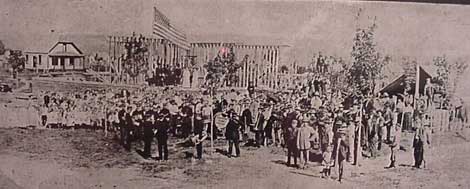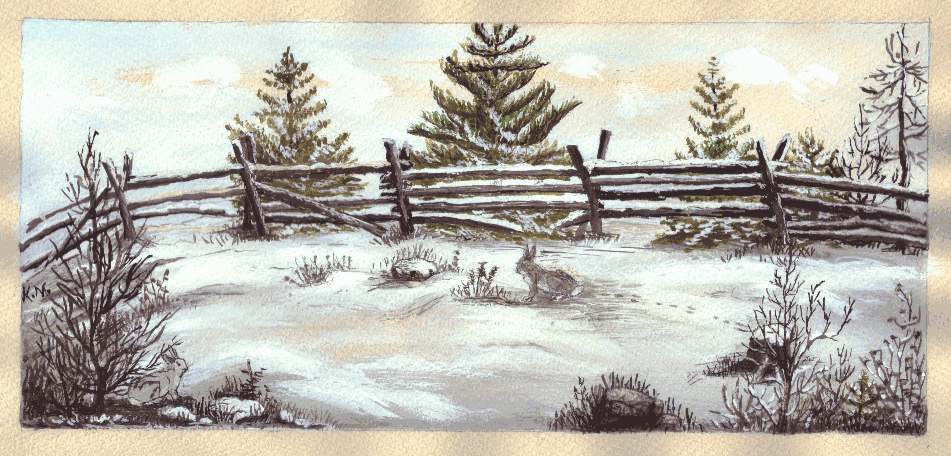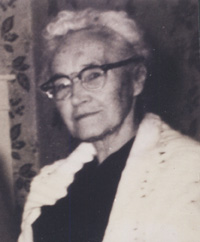Early American Settlers
By Kate Matteson
|
"Few are left to tell the many little stories which will some day be gone forever. This paper tells stories typical of the experiences of all early settlers -- some had more hardships, some less. "The first highway engineers were the Indians with their network of trails which cover our state. The settlers from the south followed some of the old Indian trails, and today, some of our highways still follow them. It is pleasant to know that some great men traveled along our shores, and that father Marquette is buried not too far from us. "Early settlers were required to brave hunger, loneliness, the dangers from Indians, and wild animals in order to find a land to call their own. As we look back, we, who have so many comforts such as our food, homes, clothing, may not realize the terrible hardships endured by those early settlers. Some came for the love of adventure while others sought only a home." Our First Winter in the Woods"Our family's first winter will never be forgotten, because Mother was sickly and Father was young and inexperienced with the ways of the woods. It was during that first terrible winter that the Indians brought us venison. Many times, without their aid I doubt if we would have survived. So, we grew to love the wild country and the people of eighty years ago. [80 years before 1958: 1878] "Some early unknown squatter had planted a lilac bush and three apple trees near our home. Some times at night an Indian squaw with a heavy papoose strapped on her back, and her big, proud brave, walking behind her in the path she made, would come. Dad would take up a floor board, go down and bring up three Wagner apples. They would beam and really smile. The next summer she came with a small one on her back and the other trudging along. She brought Mother a basket she had made. Mother gave her corn bread and berry jam." When We Were Small"When we were very small, my brother and I had diphtheria. There was no doctor nearer than Traverse City. Mother pulled us through this terrible time with salt pork and kerosene around our neck, gargling with salt, and vinegar -- and constant prayers. "Mother brought a feather bed north along with a few of her most prized possessions. My trundle bed was made of hewed sticks with tick of maybe at first hemlock or pine boughs, then later of straw. Oat straw was softer and did not pick, but made much dust. Wheat straw lasted longer. It went crinkle, crunch every time you moved or even breathed. You had to hang on the first night or fall off. "After two or three years, father got an ox team. We had often walked eight miles to Bear Lake after our supply of corn meal had given out, and would carry a sack of flour home on his back. The settlers planted potatoes, corn, and turnips in little spots among stumps and brush piles. The virgin soil was warm, and things grew rapidly before white men devastated the forests. There were no potato bugs for years, or for that matter, very few of any of our modern pests. They came later from with immigrants other continents. "Game was usually plentiful. At first, most men had to be careful because the forest was almost limitless, and a careless hunter could be lost for many days. Later, laws were passed limiting the amount of hunting and fishing. Some times after meat was scarce, my father would slip down to the little buckwheat patch in the moonlight, shoot a deer, dress it, cut up chunks, and leave them on doorsteps of neighbors who lived miles apart. He would get back before daylight, and the neighbors never told. How delicious that venison would smell frying in the morning!" "In these days the words juvenile delinquency were unknown. Each child had to help get food or wood. How did they exist without "Rock n' Roll," movies, and television? They had the songs in the morning of hundreds of birds, the joy of finding the first spring beauties, trilliums, violets in the spring, and many a spanking was received for eating looks. We had a tree with a chickadee nest in a hole which we watched. When we tapped on the tree, they would light on us. Some one gave us a cat named Neddie, and in due time, Neddie had kittens. This was very wonderful, but one night, Neddie took her kittens up in a hollow tree so that we could not touch them." Arcadia Was Nearly a Wilderness"This Arcadia was nearly a wilderness when Amanda Manke Meitz was born. There was no help near, so a man passing by called to an Indian couple who were fishing nearby. The squaw came and delivered Amanda in fine shape. (Amanda has given me permission to write this.) "After a few years, Mother's sister and her husband ventured up to see how her "poor" sister was doing. By then there were large clearings, cattle, horses, pigs, and chickens. We asked for nothing. We were free with 160 acres of good government land. Later we had company every summer. They seemed to enjoy it very much." Civilization Arrives"We got one of the first washing machines in the area. The job of cleaning clothes was still almost as hard as rubbing by hand, but the machine did more at a time. Relatives came, sophisticated ones, and upon seeing the washing machine remarked about it being up in our wild north country. By then we had a church, schools and everything appeared to be civilized. Still they did sometimes call us "moss backs," which we resented very much, because we were proud of living in the woods so long. "Many happy times were had later at barn raisings, quiltings, and spelling bees. The first school started in an old log house belonging to Professor Wood who built it on the place now known as the Crawford farm. The new school house was known as the Wood School." Life in Arcadia"The first camp meetings were held in the woods across from the Feltz place, Mary Ebert's uncle. I was small, but I remember them singing "Shall We Gather at the River." All the prayers and testimonies were sincere. Then a Sunday School started. The first Christmas tree ever for miles about was at the Sunday School. It was a great occasion. I received a doll. Lumberjacks and everyone came. Women made popcorn balls for all. "Then the Blaine Literary Society was organized, which lasted for years. Male quartettes of lumberjacks sang wonderfully. Dick Chamber, Ernest Shigley, Grace McGill's father, and others sang. There were many heated debates held when the Wood School challenged the Malcolm School or Putney School in Arcadia. It was known then, I think, as Starkeville. Topics for debate ranged all the way from the Civil War to hard cider versus tea. But NO LADIES AID YET. Then the Manistee County Fair started, and this was a wonderful thing. "In those days funerals were very sad indeed with the depressing hymns. Weddings gave promise of long and loud chivarees until maybe some discovered that the bridal couple had escaped."  Arcadia High School Construction Arcadia High School ConstructionThe view from Lake Street looking northeast in 1910. By this time, Kate Robbins was married to Lemuel Matteson and living in town in the house shown in the background on the left. Reminders of a Past Day"Nearly all of the old settlers have passed on, but there are many spots in the woods today where you may find an old apple tree and a lilac bush -- always a lilac bush -- as a reminder of the days one hundred years ago when it was planted by hands unknown. Here and there, often far from a present-day road one sees a pit, and here and there a weather beaten board, lonely reminders of a past day when perhaps laughter and fun were once present in the house which stood there." -- Kate Matteson, 1958 |
Home
|
 "Happy Easter, Lyle" by Kate Matteson. 1956. Age 77.
"Happy Easter, Lyle" by Kate Matteson. 1956. Age 77.